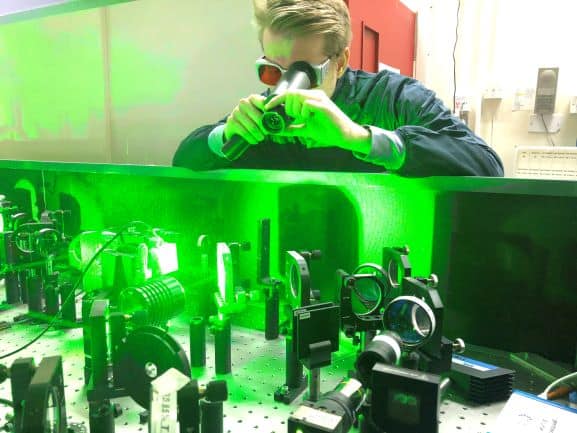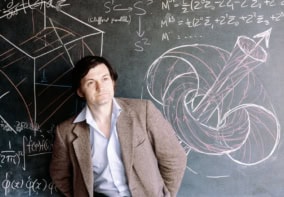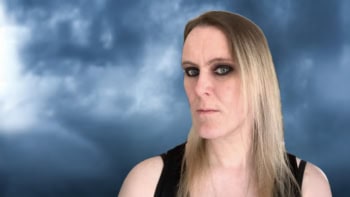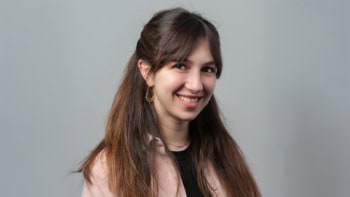Laurence Bradley is a laser scientist at the UK’s Central Laser Facility (CLF).
This post is part of a series on how the COVID-19 pandemic is affecting the personal and professional lives of physicists around the world. If you’d like to share your own perspective, please contact us at pwld@ioppublishing.org.

As a laser scientist, I’m responsible for ensuring that the CLF’s Vulcan laser operates smoothly for our experimental users. A workday for me can vary considerably depending on the operational needs of our users, but I would typically spend my time aligning the beam and making sure all aspects of the system are working, from the oscillators to laser diagnostics.
We had two experiments running before the lockdown. The first was from an Oxford University group studying dust charging and destruction in shocked plasmas, while the second was an experiment that was using our petawatt beamline to investigate the source mechanism of electromagnetic pulses. We were a few weeks into the first experiment and in the setup stages of the second when the seriousness of the pandemic in the UK started to affect our work.
Change of plan
My role has gone from being very experimental to more theoretical, and it is a challenge to change the way you work when you’re used to the activity and fast pace of doing experimental physics. However, as a recent graduate, my experience of remaining productive while working independently and remotely on a research degree is fresh in my mind, and I think that has helped.
At the moment, I am working alongside my colleagues on research relevant to Vulcan and the laser facility, and I believe the group is working well under the circumstances. The Vulcan group is meeting every day on the online platform Zoom, and it has been nice to keep in touch with colleagues and students. I like these meetings because they give me a sense of normality. It’s only when it’s taken away from you that you realize the importance of human interaction. Video conferencing is an invaluable tool at times like this to contact each other and stay well connected.
Supporting research
The CLF is run by the Science and Technology Facilities Council (STFC, part of UK Research and Innovation), and it has responded positively to the crisis. It’s inspiring to hear about the ways my organization is supporting efforts to tackle the pandemic – for example, by offering supercomputing power at the Hartree Centre to help with modelling work, or by giving rapid access to the CLF’s Octopus biological imaging facility for research relevant to COVID-19. We have also given most of our clean room personal protective equipment to the National Health Service.
The shutdown of experiments at Vulcan has given us time to focus on our research work and prepare articles for the STFC’s annual report. Already, we have produced an article on some ongoing work we did in the laboratory involving the development of a device to strengthen Vulcan’s diagnostic capabilities. The STFC is also encouraging staff to develop new skills, for example, learning how to use software for optical design and computer aided design. These personal development activities will prove helpful in our roles well beyond the pandemic.
Automation and remote access
I was hoping to attend more international conferences on laser and plasma physics, but with travel restrictions expected to be in place for the foreseeable future, I think 2021 will be a much better year for that. A lot of conferences have simply postponed until 2021 anyway.

Physics in the pandemic: ‘A lack of childcare hugely reduces productivity’
At Vulcan, there are discussions about how we might automate some of our day-to-day tasks and provide remote access to users. Obviously, Vulcan requires human minds and experience to operate safely, but our turn-on procedures could incorporate some level of automation, and I can imagine some changes to operations that could see users accessing the facility remotely. In the short term, this would help to minimize the number of staff members required to be in the facility at any one time, but it may prove to be a positive change to standard practice if it turns out to be successful.
As for me personally, I live in a small village surrounded by the Oxfordshire countryside, and one positive consequence of the lockdown is that nature has had some respite during the time we’ve all spent indoors. I have observed many more bees and butterflies on my walks and in my garden. The air feels and smells cleaner too. It will be interesting to look back on this time in the long-term future and see if the pandemic was a catalyst for worldwide environmental change.



